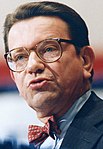| ||||||||||||||||||||||||||||||||||||||||||||||||||||||
4,105 delegates to the 1988 Democratic National Convention 2,053 (majority) votes needed to win | ||||||||||||||||||||||||||||||||||||||||||||||||||||||
|---|---|---|---|---|---|---|---|---|---|---|---|---|---|---|---|---|---|---|---|---|---|---|---|---|---|---|---|---|---|---|---|---|---|---|---|---|---|---|---|---|---|---|---|---|---|---|---|---|---|---|---|---|---|---|
| ||||||||||||||||||||||||||||||||||||||||||||||||||||||
 First place by convention roll call | ||||||||||||||||||||||||||||||||||||||||||||||||||||||
| ||||||||||||||||||||||||||||||||||||||||||||||||||||||
From February 8 to June 14, 1988, voters of the Democratic Party chose its nominee for president in the 1988 United States presidential election. Massachusetts governor Michael Dukakis was selected as the nominee through a series of primary elections and caucuses culminating in the 1988 Democratic National Convention held from July 18 to July 21, 1988, in Atlanta, Georgia.
Reeling from the disastrous 1984 United States presidential election, the Democratic Party grew a desire for a presentable candidate for 1988, the Democrats just had a promising midterm election in 1986, which saw Democratic gains in Congress that upended Republican rule of the Senate. The first candidates for the Democratic nomination were Gary Hart, Joe Biden (who actually became President far later), Michael Dukakis, and Pat Schroeder, but Biden withdrew due to a plagiarism scandal, Gary Hart ran for President in 1984 and lost, he was one of the original New Democrats, he ran for a second try at the nomination in 1987 only to see his presidential aspirations dashed by a sex scandal. Biden, Dukakis, Paul Simon, civil rights leader Jesse Jackson, Senator Al Gore (who became Vice President four years later), future House Minority Leader Dick Gephardt, and Gary Hart were dubbed by the media as "the seven dwarfs". Dukakis won 42% of the popular vote, which meant 58% of Democratic voters rejected him for other candidates, repeating a problem Walter Mondale suffered in 1984, and no candidate won a majority of delegates necessary to become the nominee and avoid a brokered convention, but Dukakis won the nomination at the convention floor.
In the general election, Dukakis and his running mate from Texas, Lloyd Bentsen, took on Vice President George Bush and his running mate Senator Dan Quayle, but the campaign was cursed with the perception that they were too left-wing, especially on issues like the death penalty for murder, and bad optics, like the cringe photo op of him taking a joy ride on a tank drawing laughter and ridicule, stumbled the Dukakis campaign. Dukakis and Bentsen went on to lose the general election by a wide margin to Bush and Quayle, racking up 111 electoral votes and 45.7% of the popular vote, though a better showing than Mondale from 1984 that Dukakis kept Democrats in complete control of Congress. Until 2004, this was the last Democratic primary contest in which the nominee went on to lose the popular vote.
© MMXXIII Rich X Search. We shall prevail. All rights reserved. Rich X Search





